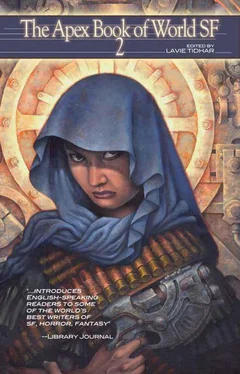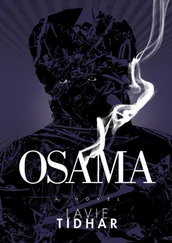The war, the strike. Three years of insurrection. Fourteen months of controlling the best part of the aether mine-generator, Catalonia, as the Federalists had started to call it. However, even with rifles and deaths and Tesla-mortars, that sphere sucking mystical energy from the vacuum was the only place in the whole universe, or so it was told, in which a motolang and a golem could live without begging for the approval of their owner-creators? Even if it were true, it was something that’d never be possible anywhere on Earth.
He came closer to Chaya, gears grinding, engines almost frozen due to the cabin’s poor heating, and sat on the edge of the bed. Chaya’s face rested in her hands, as she did when she anticipated his over-romanticised tone . “There’s beauty in the word, camarada Chaya,” he said. “An untouchable kind of beauty, invisible to the eye. Something that exists wherever there’s solidarity and—”
“What about the barricades?” Her voice came cold and as hard as stone. “Behind the barricades there are humans that never stop being human. Except when they’re shot dead or die on the tip of a bayonet. That ain’t beautiful, you know? And it’s not beautiful when they sing The Internationale and look down on us because, in a way, they’re still our lords. They’re humans, Fritz. Unlike us.”
“What’s your problem?” he grumbled. “You chose to come along. You know this is our chance, Chaya, the only chance we have to build a life together. Any life. Be it good, bad, mediocre. What? You think we better get back to Mauritzstadt and serve House Goradeski?”
“They’re good people. You know that.”
“Humans. Lords. You’ve just said that. Your lords, your makers. And even if I’m thankful to Mr Goradeski for the decency of giving my goddamn punched cards back, I hate that bastard for not letting me buy you, for not letting me marry you.” Fritz stood before her, joints creaking, an angry tick-tock, tick-tock coming from beneath his brass thorax. “A sin, he told me.” As if I wanted that stupid rabbi’s blessings.”
Chaya punched the bed in anger, crushing the iron frame under the mattress. “Fuck!” The agonising screech of metal swallowed up their shouts. “I just don’t want you to be disappointed, okay? Look, I’ve escaped with you. I’m here in this aethership, remember? With you. I know Catalonia’s our only chance, but your dream may not be that sweet. And I love you too much to see you sad and let down.”
Fritz observed the copper lines framing the cabin’s velvety walls; adorned with so many organic motifs and engravings it was as if the room itself were alive. A completely unexplored jungle. Next to the inter-phone on the night table, Dr Cavalcante’s letter gave his tense coils some relief. His occultist friend, well-known in Mauritzstadt’s esoteric society, was serving as a field medic for Catalonia’s international brigades. His missive had ultimately persuaded both non-humans to flee. Fritz turned to Chaya, accepting the truce, or their particular way of making a truce. After all, she was right. Again. As always. He really was just an automaton that dreamt of open fields, broken locks, sunny days and people’s respect. He dreamt of being a hero, of freeing himself after fighting tyranny and oppression. But he’d never held a rifle. Not even to hunt with Dr Goradeski in the forests close to the Guararapes hill. His only duties were doing the accounts for his master’s riches and tutoring the heirs to the clan.
“It’ll work, Chaya. I believe— No, I’m sure it’ll work. Trust me.”
She did trust him. He knew it. It was written in her smile. But he also knew she was right. Life wouldn’t be pretty. They made love for a few more hours.
Though it was an aethership station, it didn’t behave like one. It didn’t breathe like one. There was no smoking, no mink coats, no comings and goings of serfs, luggage or hats. Except for the brassy majesty of the Nassau , a true aether leviathan, there was nothing in it that mirrored the luxury found in the ports of Mauritzstadt or any other Earthly empire. But there were people. Lots of people. A Babel debarking with Genovese and Madrileño accents, others being Balkan and Ottoman, all too confused to be distinguishable. There were expatriates from the Brazilian empire, too, and many Mauritzes. Men wearing cheap, brown cotton. Their bodies kept together only by loose, rusty screws, steam leaking from their joints. There were women, too, with severe eyes, coal-stained dresses and calluses, guarding what little luggage they possessed. But they were all smiling for they were pleased to step on firm ground. Not ground, exactly, but that alchemical crystal shielding the arcologies sailing the Earthly seas.
Fritz was overcome with vertigo when he looked at the curves in the station’s columns, each one preciously engraved in typical Art Nouveau style. He almost fell to the floor when, beneath his feet, he saw the city cascading down the inner walls of the sphere and, at the centre, the aether condenser, the heart of the factory, with its colossal tubes containing hundreds of pipes which, in their turn, carried thousands of pre-processed aether foam, so wild and volatile that a simple leak would open a metaphysical sinkhole big enough to swallow all God’s Creations. At least that’s what the Luddites said.
A mechanical arm waved over the caps of the volunteers coming fast in his direction. A whistle could be heard coming from the crowd. It was like an invisible teakettle leaving a trail of white puffs of smoke in the air. The immigrants started to give way as the steam got closer and closer. From them emerged a hybrid vehicle, something between a bicycle and a locomotive, a big wheel in front of a chimney and two small vulcanised pneumatics behind, too close to the stove heating the boiler. It made a hellish noise and Fritz couldn’t help but agree with Chaya when she said that the thing stank of garbage tea. On the top of the vehicle, the pilot pulled the brake lever and turned the handlebar to the left, forcing the machine to slide for some metres before stopping just a few inches in front of the frozen couple. “I call it,” shouted the man, forcing a dramatic pause, “the locomocycle.”
The automaton laughed at the pilot’s pomp and at his fiancée’s disgusted expression. “It’s beautiful, Emilio,” he shouted back. “Your design?”
“Every single rivet.” The man grinned behind a pair of pitch-black goggles that made him look like a juvenile insect wearing a waistcoat and greaves. There was a blue, spectral glimmer deep inside the blackness of his goggles. The crowd kept its distance from the locomocycle, mainly because its boiler gave off an unbearable heat. But they couldn’t stop admiring that automotive marvel. The man called Emilio stepped down from the vehicle, leaning his arm on the boiler. He faced the golem with keen interest. “Is she the lucky one?”
“That’s her,” Fritz answered, holding his lover’s hand, suddenly solemn.
“Did she bring the equipment I asked for?” His gaze was fixed on Chaya, who was uneasy at being scrutinised not only by the scientist’s goggled eyes, but also by the judging eyes of the women at the station, condemning the bourgeois style of her housemaid’s dress. Worse, she wasn’t precisely a maid, for in their eyes she wasn’t a woman, but a construct turned to life by the power of the one thing more terrible than the Holy Church: magic.
“You can speak directly to me, sir. I speak and decide for myself.”
“My dear,” Fritz intervened, “this is Dr Emilio Cavalcante, the one I told you about. Physician, engineer and member of the Order of Oriental Templars.”
“Former member.” Dr Cavalcante raised a mechanical finger as an exclamation mark, his gears spinning with the movement. “Apparently, my friend, the Order does not approve of my mystical theories, not to mention my political practices. And vice versa.” Dr Cavalcante moved two steps closer to the couple, closer to the golem. “ Salud, camarada ! Forgive me if I sounded a little bit sexist, but I was concerned with the equipment. You see, it’s not every day that—”
Читать дальше












